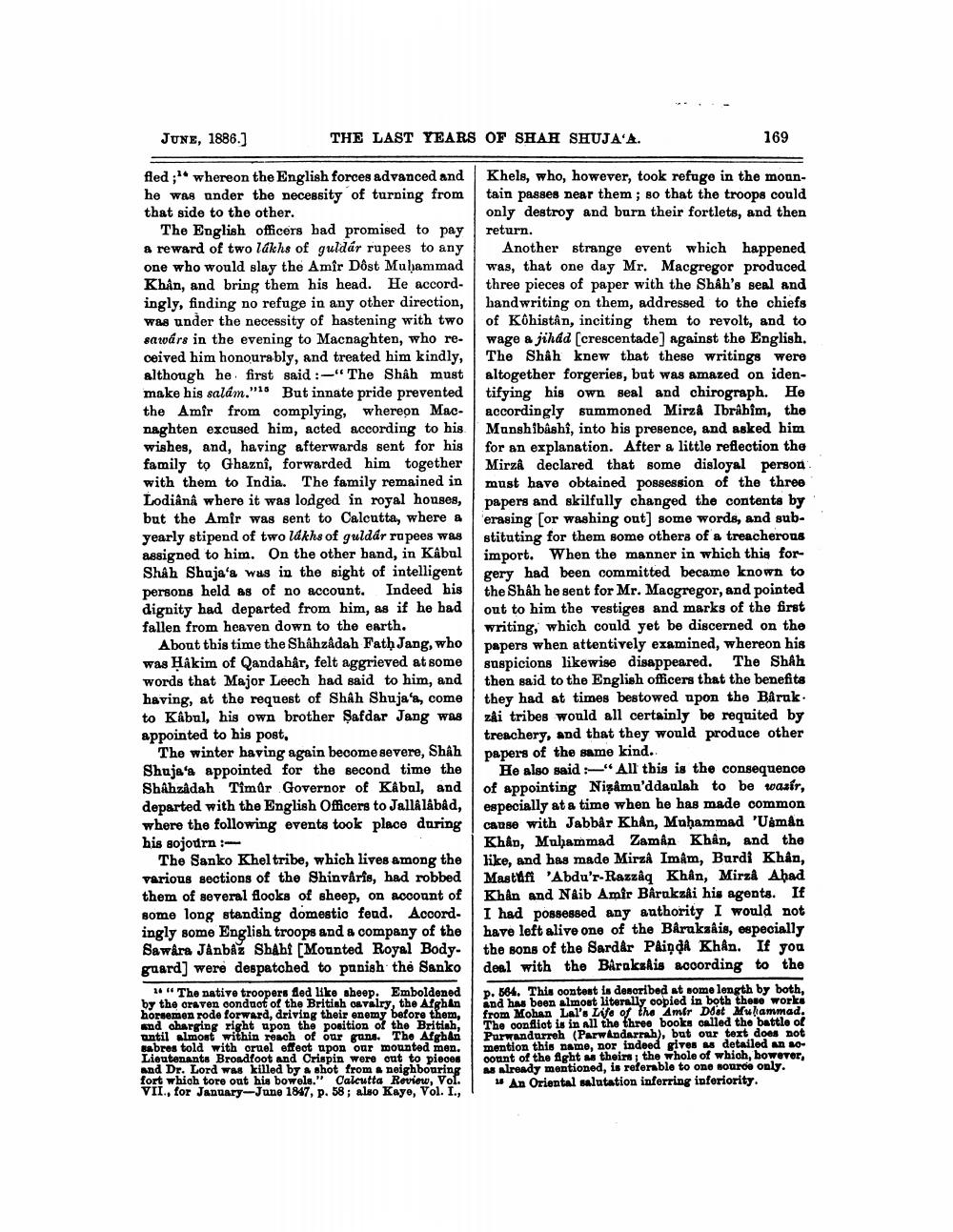________________
JUNE, 1886.)
THE LAST YEARS OF SHAH SHUJAA.
169
fied; whereon the English forces advanced and he was ander the necessity of turning from that side to the other.
The English officers had promised to pay a reward of two lakhs of guldár rupees to any one who would slay the Amîr Dôst Muhammad Khan, and bring them his head. He accordingly, finding no refuge in any other direction, was under the necessity of hastening with two sawars in the evening to Macnaghten, who received him honourably, and treated him kindly, although he first said :-"The Shah must make his salám."16 But innate pride prevented the Amir from complying, whereon Macnaghten excused him, acted according to his wishes, and, having afterwards sent for his family to Ghaznî, forwarded him together with them to India. The family remained in Lodiânî where it was lodged in royal houses, but the Amir was sent to Calcutta, where a yearly stipend of two ldkhs of gulddr rupees was assigned to him. On the other hand, in Kabul Shah Shuja'a was in the sight of intelligent persons held as of no account. Indeed his dignity had departed from him, as if he bad fallen from heaven down to the earth.
About this time the Shahzadah FathJang, who was Hâkim of Qandahår, felt aggrieved at some words that Major Leech had said to him, and having, at the request of Shah Shuja'a, come to Kâbul, his own brother Safdar Jang was appointed to his post,
The winter having again become severe, Shah Shuja'a appointed for the second time the Shahzadah Timur Governor of Kåbal, and departed with the English Officers to Jallalábad, where the following events took place during his sojourn :
The Sanko Khel tribe, which lives among the various sections of the Shinvaris, had robbed them of several flooks of sheep, on account of some long standing domestic feud. Accordingly some English troops and a company of the Sawara Janbaz Shahi (Mounted Royal Bodyguard) were despatched to punish the Sanko
24 "The native troopers fled like sheep. Emboldened by the craven conduct of the British osvalry, the Afghan horsemen rode forward, driving their enemy before them, and charging right upon the position of the British, until almost within reach of our guns. The Afghan Babres told with cruel effect upon our mounted men. Lieutenants Broadfoot and Crispin were out to pieces and Dr. Lord was killed by a shot from a neighbouring fort which tore out his bowels." Calcutta Review, Vol. VII., for January-June 1847, p. 58 ; also Kaye, Vol. I.,
Khels, who, however, took refuge in the moantain passes near them ; so that the troops could only destroy and burn their fortlets, and then return.
Another strange event which happened was, that one day Mr. Macgregor produced three pieces of paper with the Shah's seal and handwriting on them, addressed to the chiefs of Kohistân, inciting them to revolt, and to wage a jihdd (crescentade) against the English. The Shâh knew that these writings were altogether forgeries, but was amazed on identifying his own seal and chirograph. He accordingly summoned Mirz& Ibrahim, the Manghibashi, into his presence, and asked him for an explanation. After a little reflection the Mirzê declared that some disloyal person must have obtained possession of the three papers and skilfully changed the contents by erasing (or washing out] some words, and substituting for them some othera of a treacherous import. When the manner in which this forgery had been committed became known to the Shah be sent for Mr. Macgregor, and pointed ont to him the vestiges and marks of the first writing, which could yet be discerned on the papers when attentively examined, whereon his suspicions likewise disappeared. The Shah then said to the English officers that the benefits they had at times bestowed upon the Baruk. zâi tribes would all certainly be requited by treachery, and that they would produce other papers of the same kind.
He also said: "All this is the consequence of appointing Nişámu'ddaulah to be wasir, especially at a time when he has made common cause with Jabbar Khân, Muhammad 'Ugman Khan, Muhammad Zaman Khan, and the like, and has made Mirza Imâm, Burdi Khan, Mastifi 'Abdu'r-Razzaq Khan, Mirza Ahad Khan and Naib Amir Barukzki his agents. I I had possessed any authority I would not have left alive one of the Barakalis, especially the sons of the Sardar Paiņ&A Khan. If you deal with the BarakzAis according to the P. 564. This content is described at some length by both, and has been almost literally copied in both these works from Mohan Lal's Life of the Amer Ddat Muhammad. The conflict is in all the three books called the battle of Purwandurreh (Parwandarrah), but our text does not mention this name, nor indeed gives us detailed an nooount of the fight as theirs the whole of which, however, As already mentioned, is referable to one source only.
w An Oriental salutation inferring inferiority.




